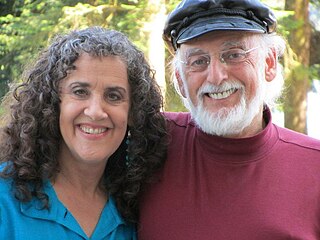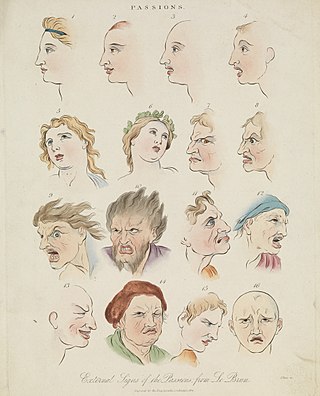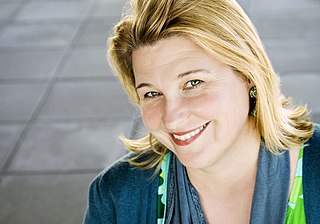
Stress, whether physiological, biological or psychological, is an organism's response to a stressor such as an environmental condition. When stressed by stimuli that alter an organism's environment, multiple systems respond across the body. In humans and most mammals, the autonomic nervous system and hypothalamic-pituitary-adrenal (HPA) axis are the two major systems that respond to stress. Two well-known hormones that humans produce during stressful situations are adrenaline and cortisol.
Feelings are subjective self-contained phenomenal experiences. According to the APA Dictionary of Psychology, a feeling is "a self-contained phenomenal experience"; and feelings are "subjective, evaluative, and independent of the sensations, thoughts, or images evoking them". The term feeling is closely related to, but not the same as, emotion. Feeling may for instance refer to the conscious subjective experience of emotions. The study of subjective experiences is called phenomenology. Psychotherapy generally involves a therapist helping a client understand, articulate, and learn to effectively regulate the client's own feelings, and ultimately to take responsibility for the client's experience of the world. Feelings are sometimes held to be characteristic of embodied consciousness.
Social cognition is a topic within psychology that focuses on how people process, store, and apply information about other people and social situations. It focuses on the role that cognitive processes play in social interactions.

A microexpression is a facial expression that only lasts for a short moment. It is the innate result of a voluntary and an involuntary emotional response occurring simultaneously and conflicting with one another, and occurs when the amygdala responds appropriately to the stimuli that the individual experiences and the individual wishes to conceal this specific emotion. This results in the individual very briefly displaying their true emotions followed by a false emotional reaction.

In colloquial usage, contempt usually refers to either the act of despising, or having a general lack of respect for something. This set of emotions generally produces maladaptive behaviour. Other authors define contempt as a negative emotion rather than the constellation of mentality and feelings that produce an attitude. Paul Ekman categorises contempt as the seventh basic emotion, along with anger, disgust, fear, happiness, sadness and surprise. Robert C. Solomon places contempt on the same emotional continuum as resentment and anger, and he argues that the differences between the three are that resentment is anger directed towards a higher-status individual; anger is directed towards an equal-status individual; and contempt is anger directed towards a lower-status individual.
Emotional reasoning is a cognitive process by which an individual concludes that their emotional reaction proves something is true, despite contrary empirical evidence. Emotional reasoning creates an 'emotional truth', which may be in direct conflict with the inverse 'perceptional truth'. It can create feelings of anxiety, fear, and apprehension in existing stressful situations, and as such, is often associated with or triggered by panic disorder or anxiety disorder. For example, even though a spouse has shown only devotion, a person using emotional reasoning might conclude, "I know my spouse is being unfaithful because I feel jealous."

John Mordechai Gottman is a Jewish American psychologist, professor emeritus of psychology at the University of Washington. His work focuses on divorce prediction and marital stability through relationship analyses. The lessons derived from this work represent a partial basis for the relationship counseling movement that aims to improve relationship functioning and the avoidance of those behaviors shown by Gottman and other researchers to harm human relationships. His work has also had a major impact on the development of important concepts on social sequence analysis.
An emotional bias is a distortion in cognition and decision making due to emotional factors.
Meta-emotion is "an organized and structured set of emotions and cognitions about the emotions, both one's own emotions and the emotions of others". This broad definition of meta-emotion sparked psychologists' interest in the topic, particularly regarding parental meta-emotion philosophy.
Affect displays are the verbal and non-verbal displays of affect (emotion). These displays can be through facial expressions, gestures and body language, volume and tone of voice, laughing, crying, etc. Affect displays can be altered or faked so one may appear one way, when they feel another. Affect can be conscious or non-conscious and can be discreet or obvious. The display of positive emotions, such as smiling, laughing, etc., is termed "positive affect", while the displays of more negative emotions, such as crying and tense gestures, is respectively termed "negative affect".

John Terrence Cacioppo was the Tiffany and Margaret Blake Distinguished Service Professor at the University of Chicago. He founded the University of Chicago Center for Cognitive and Social Neuroscience and was the director of the Arete Initiative of the Office of the Vice President for Research and National Laboratories at the University of Chicago. He co-founded the field of social neuroscience and was member of the department of psychology, department of psychiatry and behavioral neuroscience, and the college until his death in March 2018.

Emotion classification, the means by which one may distinguish or contrast one emotion from another, is a contested issue in emotion research and in affective science. Researchers have approached the classification of emotions from one of two fundamental viewpoints:
- that emotions are discrete and fundamentally different constructs
- that emotions can be characterized on a dimensional basis in groupings
Emotional self-regulation or emotion regulation is the ability to respond to the ongoing demands of experience with the range of emotions in a manner that is socially tolerable and sufficiently flexible to permit spontaneous reactions as well as the ability to delay spontaneous reactions as needed. It can also be defined as extrinsic and intrinsic processes responsible for monitoring, evaluating, and modifying emotional reactions. Emotional self-regulation belongs to the broader set of emotion regulation processes, which includes both the regulation of one's own feelings and the regulation of other people's feelings.

In humans, posture can provide a significant amount of important information through nonverbal communication. Psychological studies have also demonstrated the effects of body posture on emotions. This research can be traced back to Charles Darwin's studies of emotion and movement in humans and animals. Currently, many studies have shown that certain patterns of body movements are indicative of specific emotions. Researchers studied sign language and found that even non-sign language users can determine emotions from only hand movements. Another example is the fact that anger is characterized by forward whole body movement. The theories that guide research in this field are the self-validation or perception theory and the embodied emotion theory.

The effects of stress on memory include interference with a person's capacity to encode memory and the ability to retrieve information. Stimuli, like stress, improved memory when it was related to learning the subject. During times of stress, the body reacts by secreting stress hormones into the bloodstream. Stress can cause acute and chronic changes in certain brain areas which can cause long-term damage. Over-secretion of stress hormones most frequently impairs long-term delayed recall memory, but can enhance short-term, immediate recall memory. This enhancement is particularly relative in emotional memory. In particular, the hippocampus, prefrontal cortex and the amygdala are affected. One class of stress hormone responsible for negatively affecting long-term, delayed recall memory is the glucocorticoids (GCs), the most notable of which is cortisol. Glucocorticoids facilitate and impair the actions of stress in the brain memory process. Cortisol is a known biomarker for stress. Under normal circumstances, the hippocampus regulates the production of cortisol through negative feedback because it has many receptors that are sensitive to these stress hormones. However, an excess of cortisol can impair the ability of the hippocampus to both encode and recall memories. These stress hormones are also hindering the hippocampus from receiving enough energy by diverting glucose levels to surrounding muscles.

Tania Singer is a German psychologist and social neuroscientist and the scientific director of the Max Planck Society's Social Neuroscience Lab in Berlin, Germany. Between 2007 and 2010, she became the inaugural chair of social neuroscience and neuroeconomics at the University of Zurich and was the co-director of the Laboratory for Social and Neural Systems Research in Zurich. Her research focuses on the developmental, neuronal, and hormonal mechanisms underlying human social behavior and social emotions such as compassion and empathy. She is founder and principal investigator of the ReSource project, one of the largest longitudinal studies on the effects of mental training on brain plasticity as well as mental and physical health, co-funded by the European Research Council. She also collaborates with the macro-economist Dennis Snower on research on caring economics. Singer's Caring Economics: Conversations on Altruism and Compassion, Between Scientists, Economists, and the Dalai Lama was published in 2015. She is the daughter of the neuroscientist Wolf Singer.
Early childhood is a critical period in a child's life that includes ages from conception to five years old. Psychological stress is an inevitable part of life. Human beings can experience stress from an early age. Although stress is a factor for the average human being, it can be a positive or negative molding aspect in a young child's life.
Emotion perception refers to the capacities and abilities of recognizing and identifying emotions in others, in addition to biological and physiological processes involved. Emotions are typically viewed as having three components: subjective experience, physical changes, and cognitive appraisal; emotion perception is the ability to make accurate decisions about another's subjective experience by interpreting their physical changes through sensory systems responsible for converting these observed changes into mental representations. The ability to perceive emotion is believed to be both innate and subject to environmental influence and is also a critical component in social interactions. How emotion is experienced and interpreted depends on how it is perceived. Likewise, how emotion is perceived is dependent on past experiences and interpretations. Emotion can be accurately perceived in humans. Emotions can be perceived visually, audibly, through smell and also through bodily sensations and this process is believed to be different from the perception of non-emotional material.
Interpersonal emotion regulation is the process of changing the emotional experience of one's self or another person through social interaction. It encompasses both intrinsic emotion regulation, in which one attempts to alter their own feelings by recruiting social resources, as well as extrinsic emotion regulation, in which one deliberately attempts to alter the trajectory of other people's feelings.
The Vulnerability-Stress-Adaptation (VSA) Model is a framework for conceptualizing the dynamic processes of marriage, created by Benjamin Karney and Thomas Bradbury. The VSA Model emphasizes the consideration of multiple dimensions of functioning, including couple members’ enduring vulnerabilities, experiences of stressful events, and adaptive processes, to account for variations in marital quality and stability over time. The VSA model was a departure from past research considering any one of these themes separately as a contributor to marital outcomes, and integrated these separate factors into a single, cohesive framework in order to best explain how and why marriages change over time. In adherence with the VSA model, in order to achieve a complete understanding of marital phenomenon, research must consider all dimensions of marital functioning, including enduring vulnerabilities, stress, and adaptive processes simultaneously.








